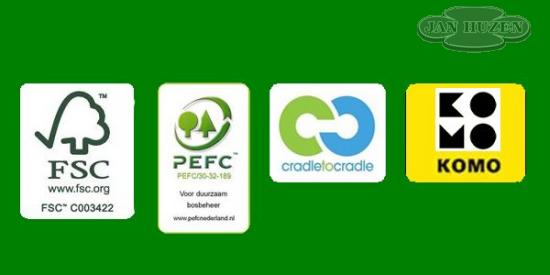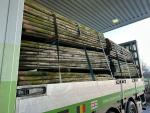Algemeen: "Forest Stewardship Council (FSC)"

FSC
The Forest Stewardship Council (FSC) is an international organization committed to responsible forest management worldwide. FSC speaks of responsible forest management when the social, ecological and economic aspects of forest management are taken into account in a balanced way. FSC has arranged this in a transparent manner. Partly because of this, FSC is supported by all major environmental and development organizations.
And FSC is unique in this!
Wood and paper products that come from an FSC-certified forest can be recognized by the FSC label. To ensure that products with this quality mark actually come from a responsibly managed forest, all links in the product's supply chain must be certified. Only when, for example, a forest manager, paper mill, paper wholesaler and printer can demonstrate that they comply with the rules of FSC, a product can be sold as FSC and the FSC logo may be placed on it. These companies are certified by independent certifiers.
PEFC
Through forest management certification, forest owners can demonstrate that they are managing their forest sustainably according to the requirements of PEFC. PEFC certified wood can be harvested from a certified forest. Chain of Custody certified companies further down the chain can process the wood (and paper) with the PEFC quality mark in products such as magazines, books, copying paper, garden wood, construction wood, laminate floors and many other products.
What does PEFC do?
PEFC has drawn up the Sustainability Benchmark for sustainable forest management based on international principles. PEFC tests whether national standards for sustainable forest management meet this benchmark. This assessment is an extensive process. National certification systems that are approved then fall under the PEFC quality mark. Currently 36 countries are members of PEFC and more than 30 of these countries have an approved standard for sustainable forest management. The national standards are revised and re-tested every five years. In this way they are continuously improved, in which PEFC is unique. The Sustainability Benchmark itself is also regularly revised.
Cradle to Cradle
The core of the Cradle to Cradle principle lies in the concept; waste is food. After their life in one product, all the materials used could be usefully used in another product. There should be no loss of quality and all residual products should be recyclable or environmentally neutral. This cycle is then complete ... and waste is food.
Sustainable development is the development in which the current generation meets its needs, without limiting the possibilities for this for the next generation. The Cradle-to-Cradle (C2C) principle goes further and aims to meet our own needs, but also to provide future generations with more possibilities. The motto is try to be good instead of less bad!
The three basic rules of the Cradle to Cradle principle are:
* Waste = food
* Sun is the energy source
* Respect for Diversity
"Industry must protect and enrich ecosystems - nature's biological metabolism. At the same time, it must maintain a safe, productive technical metabolism for high-value uses and the circulation of mineral, synthetic and other materials."
KOMO
KOMO was created to make the complex construction process more transparent. The construction and installation sector is a complex combination of different parties. With the KOMO quality mark, every link in the construction industry can count on the quality of products, processes, systems and services. With half a century of experience, KOMO is the expert in the field of certified products and processes in the Netherlands. KOMO stands for independently tested quality. Certificates have been issued for the most diverse products and processes. Users can therefore rely on the quality of products and processes. Moreover, products with a KOMO quality mark automatically also comply with the relevant legislation and regulations in construction, such as the Building Decree, the Soil Quality Decree and other requirements in the field of quality and safety.
<< BACK


